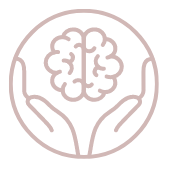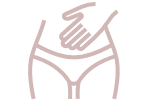You’ll meet with one of our pelvic pain specialists, who focus solely on pelvic pain. We’ll start with reviewing your full health history, including a discussion of your symptoms. This will help us to understand what you’ve been experiencing, so we can work to identify the source of your pain.
Next, we’ll conduct a full pelvic exam. Externally, we will look at your hips, abdomen, and posterior sacrum. Internally, we will evaluate the nerves and the muscles within the pelvic area. This full exam is necessary , as it will help our pelvic pain specialists understand the connection between your symptoms, and your nerve and muscle pain and dysfunction. There is no speculum, so the exam is gentle and more comfortable than that of, for example, gynecological exams you may have experienced in the past.
We will discuss our findings with you and come up with a comprehensive treatment plan TOGETHER. We want you to know that your pain is validated and that we are here to work with you on getting you back to the life you deserve.















